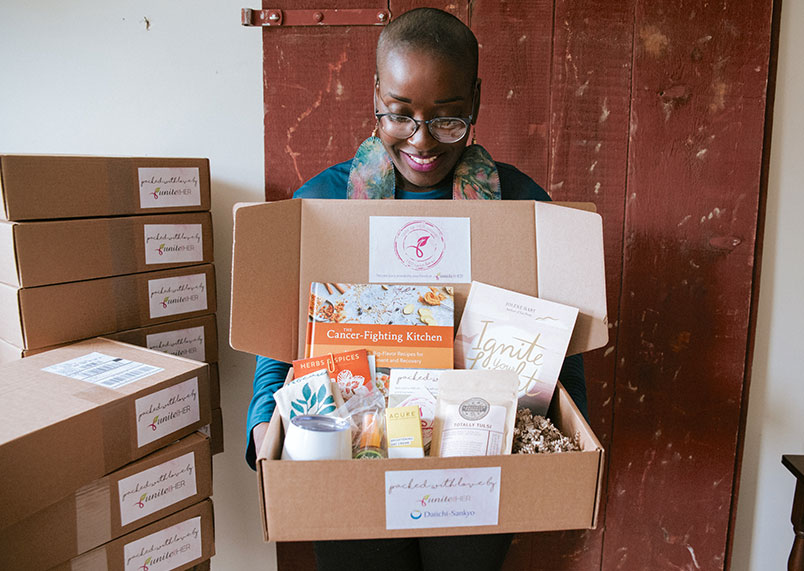By Freda Freeman
Correspondent
Facing daunting statistics, Black women often feel afraid, overwhelmed, helpless and hopeless when diagnosed with breast cancer. Advocates are coming along to walk with these women and support them on their journey.
During October – Breast Cancer Awareness Month – TOUCH, the Black Breast Cancer Alliance, is partnering with Unite for HER to provide breast cancer patients with educational resources and access to services. Together, the two nonprofit organizations created Care for HER to provide patients with free access to nurse navigators to help with medical questions, food and nutrition counseling with dietitians, and other integrative services.
Through the Care for HER program, TOUCH will provide 100 patients with 24/7 nurse navigation services, and Unite for HER will provide $2,000 worth of integrative services. The organizations will spotlight 15 patients in three cities – Durham, Philadelphia and Washington D.C. – throughout the month via social media in hopes of receiving funding from pharmaceutical companies to support their services.
Ricki Fairley, of Annapolis, Maryland, founded TOUCH to advance the science behind cancer research and to encourage cancer patients to participate in clinical trials to test anti-cancer drugs that are effective in treating Black women. Fairley, who was diagnosed with breast cancer in 2011, said her mission is to eradicate Black breast cancer. “This is my God job. I know God left me here to do this work, and I’ve been doing it ever since,” she said.
Black women are diagnosed with breast cancer younger and have a higher death rate than white women. TOUCH works to highlight the inequities of Black breast cancer and eliminate them. Fairley said there is growing research that shows Black breast cancer cells are different from white ones, which she said explains the higher death rate.
“The drugs are not working effectively for Black women. There were no Black women in clinical trials for testing the anti-cancer drugs currently available. We’re dying because the drugs were made for white breast cancer cells, not Black ones,” she said.
Fairley said the reason Black women don’t participate in clinical trials goes beyond distrust of the white medical profession. She learned doctors weren’t telling Black patients about clinical trials nor inviting them to participate. Through Fairley’s When We Trial campaign, more than 19,000 Black women have signed up for clinical trials over the past three years.
By pairing TOUCH’s volunteer Black nurse navigators with the services offered by Unite for HER, Fairley hopes to encourage even more Black women to enroll in clinical trials.
Valarie Worthy, of Durham, is a nurse navigator and shared resource manager at Duke Hospital, where she studies strategies to help increase the number of African Americans participating in clinical trials. Worthy helped found Sisters Network Triangle North Carolina, a local affiliate of the national survivorship organization, Sister Network, in 2003. Worthy later co-founded TOUCH and works with Fairley to recruit Black women to be in clinical trials and connects them to resources once they leave the hospital.
“At five o’clock, most cancer centers close down. For some women, that’s when their questions begin, especially those who continue to work through their treatment. So, we’re here to provide that support, answer questions, and look for resources in their community,” Worthy said.
As a nurse of 42 years and a 25-year breast cancer survivor, Worthy said she is a witness that cancer is not a death sentence. “I not only answer phones and have information to share, but I understand what they’re going through because I’m a survivor,” she said. “As an African American, as a cancer survivor, as a nurse, God said I needed to have all three of those things together because people will trust what you say. …Out in the community, people want to see some proof that you can make it through this thing.”
Worthy said far more people are living with cancer now, and it’s important for survivors to share their stories.
“I and many other African American survivors become the proof that this thing does not have to take you out. Even if I’m not diagnosed with the same cancer that they have, just the fact that I am a Black person that was diagnosed with cancer and I’m still alive, that’s enough living proof for the prostate cancer person, the colon cancer person, the lung cancer person. People just want to see the living proof,” she said.
For more information, visit touchbbca.org or uniteforher.org/careforher. To learn more about the HBCU internships, go to touchbbca.org/love-of-my-gurls/.

